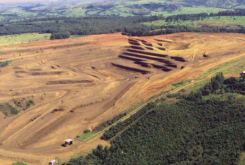The deal to transform state owned fishing company Empresa Moçambicana de Atum (Ematum) has thrust Mozambique’s fishing industry under the spotlight. The government is keen to boost the volume of fish caught to create employment and generate income. It is also about to take centre stage on regional efforts to tackle illegal, unreported and unregulated (IUU) fishing. Yet current levels of fishing may already be unsustainable because of both regulated and illicit operators.
The fishing industry has been at the centre of Mozambique’s debt scandal over the past few years. Tuna fishing boats were bought with $850 million in loans for Ematum, which is owned by the national intelligence agency. This financing, together with 2 others that were done in secret, pushed the national debt beyond sustainable levels and severely affected international confidence in the government’s fiscal policy, yet the boats have hardly operated.
Maputo has now rubber stamped the restructuring plan for Ematum, although the solution has come from a fairly unlikely source – and one that is likely to attract press interest. A private equity company, Frontier Services Group (FSG), is to take a 50% stake in the venture, which is to be renamed Tunamar. FSG was founded and is chaired by Erik Prince, a US businessman who previously set up and operated Blackwater, a private security company that was heavily involved in Afghanistan and Iraq.
Mozambican Prime Minister Carlos do Rosario told parliament that the fishing boats will be operating by the end of this year.
It seems likely that a high proportion of the fish caught will be exported to China, as Chinese state investment vehicle CITIC is now the biggest investor in FSG, with a 28.4% stake.
Chinese state owned insurance company China Taiping has also invested in FSG.
FSG, which is listed in Hong Kong, is also to provide security services to Chinese state owned companies operating overseas but Prince has said that its employees will not be armed, although it might manage armed guards from the areas within which it operates.
The industry accounts for 4% of GDP but the government is keen to increase this. For 2018, Maputo forecasts a 7% increase on the volume of legally-caught fish exported to 14,000 tonnes, just under half of all fish caught in the country. Other new investment in Mozambique’s fishing industry will greatly increase the number of fish taken from the sea.
For instance, work on building a new fishing port at Beira should be completed by this June, providing services to 16 industrial scale vessels and the capacity to handle 70,000 tonnes of fish a year. The port’s original fishing facility was destroyed by a cyclone in 2000 but is now being rebuilt with $120 million in funding from Beijing. The temporary fish harbour at Beira currently serves just eight vessels catching a total of 300 tonnes of fish a year. The fish caught will be exported, mostly to Asia by sea and also air.
The global fish crisis
However, there are doubts over whether the launch of the 24 Ematum vessels will be sustainable for fish populations in the area, given that Maputo has admitted that tuna catches are already on the verge of becoming unsustainable in Mozambique’s own waters.
Worldwide, the numbers of many fish species have fallen to dangerous levels as factory ships hoover them up more quickly than they can replace themselves. As one area becomes fished out, the giant vessels move on to another. According to figures from the United Nations’ Food and Agriculture Organization, 32% of the world’s fisheries are overexploited, depleted or recovering from depletion. This is caused by:
- illegal fishing;
- poor management;
- massive by-catch of juvenile fish;
- subsidies that result in too many fishing boats operating;
- destructive fishing practices; and
- unfair partnership agreements that allow foreign fleets to overfish the waters of developing countries.
The scale of global fishing activity became apparent in February, with the publication of the results of the first study to use satellite data from the automatic identification systems used by vessels. Reported in the journal Science, the study found that between 55% and 73% of the world’s oceans were being fished by industrial scale vessels. Chinese vessels accounted for 43% of all those identified.
As elsewhere in the world, it is difficult to be sure exactly how much fish is being caught in Mozambique. Research focused on Mozambique and Tanzania, which was undertaken by the University of Western Australia’s Dirk Zeller and the University of British Columbia’s Daniel Pauly, and published in the journal Marine Policy earlier this year, concluded that the total volumes of fish caught worldwide have been falling sharply for 20 years but that this decline has been obscured because the figures for past years severely underestimated the amount of fish caught illegally.
Lead author Zeller, said: “Our reconstructed data have shown that globally, the catches have been declining by about 1.2 million metric tons a year since the mid-1990s.” The government of Mozambique’s annual catch estimate jumped by 800% between 2003 and 2004 because it began to use a new data collection system but such figures seem unlikely to be accurate. It is far more likely that it had previously underestimated the volume of fish illegally caught. If Pauly and Zeller are correct, then Maputo’s belief that current fishing levels are sustainable – if only just – may be misplaced.
Illegal fishing
Whether or not it is sustainable to encourage more fishing, the government is right to crack down on illegal fishing. Mozambique’s Ministry of the Sea, Inland Waters and Fisheries estimates that illegal fishing accounts for 10-15% of total tuna fishing. The figure for other species may be significantly worse. Last year, the Ministry’s National Operations Directorate reported that the state lost an estimated $67 million a year to illegal fishing.
The government’s measures to tackle this include:
- Strengthening domestic regulation and inspection regimes;
- The introduction of mandatory licences and the use of vessel monitoring systems;
- Concluding bilateral agreements to tackle the problem;
- Regional cooperation through FISH-i Africa and a new regional monitoring centre, to be built in Mozambique.
In November 2017, the Mozambican parliament passed the new Regulation of Fisheries Act, which introduced fixed term licenses. Mozambique’s Minister of the Sea, Inland Waters and Fisheries, Agostinho Mondlane, said: “This decision brings stability to the owners of the fishing industry, because they know with accuracy the period of validity of fishing rights, which ranges from a minimum of three to a maximum of 20 years.”
The government now requires licensed large scale fishing vessels to use a vessel monitoring system, so that they can be tracked. Factory ships account for a large proportion of illicit fishing but even small scale fishermen are employing illegal practices, such as using mosquito nets treated with insecticide to catch fish. The National Institute of Fish Inspection (INIP) insists that it is carrying out inspections to seize nets that are unsuitable because they take juvenile fish.
Maputo is seeking to fund inspections through taxes on large fishing vessels, which were set at a maximum of 2.5% of the value of the catch in 2017, depending on the species targeted, but are being increased annually to a maximum of 5% by 2021. Small scale, local fishing boats pay a set fee of 1,000 meticais ($16.47) a year.
In April, the governments of Mozambique and Madagascar announced that they would soon sign a memorandum of understanding on tackling illegal fishing in the Mozambique Channel, the offshoot of the Indian Ocean that separates the two countries. Mondlane said “satellite, radar and port inspections will be used to crack down on illegal fishing in the Indian Ocean, where tuna catches have reached the maximum sustainable limits.” Similarly, Maputo and Pretoria are working together on the issue through the Interpol Fisheries Crime Working Group.
Regional cooperation
Only security monitoring, including by patrol boats, can tackle unlicensed and unregulated fishing. Mozambique has long lacked sufficient patrol boats to monitor its vast maritime territory. Eight African countries bordering the western Indian Ocean, including Mozambique, have now come together in FISH-i Africa, which allows their various fishing authorities to share information via an internet platform on fishing boats fishing illegally, using banned equipment, or using forged licences.
FISH-i Africa has its own investigation teams, who are sent to inspect suspect boats. The platform also allows national inspectors to provide support to each other on the ground, boosting numbers where required. A recent report by FISH-i Africa stated: “It may be those vessels are fishing with the right gear in the right place and taking the right species, but the whole operation is fundamentally illegal because it’s not the vessel it’s saying it is, or there are three vessels fishing under the same name using a single license.”
Regional efforts should also be given more teeth following the signing of an agreement to set up the Southern African Development Community (SADC) Monitoring Control and Surveillance Coordination Centre. The centre will be set up this year in Mozambique.
In a statement issued in March on behalf of all signatories, South Africa’s Department of Agriculture, Forestry and Fisheries said: “Fisheries crime is not just a national challenge but it is also a global scourge that undermines governments’ poverty eradication efforts. The fact that fisheries crime is largely transnational in nature raises a need for organised global communities to work together in addressing illegal fishing.” SADC members are currently discussing whether to incorporate FISH-i Africa into the new centre in Mozambique.




